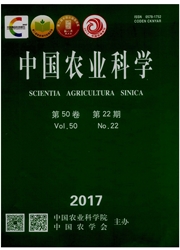

 中文摘要:
中文摘要:
【目的】从分子水平研究苦荞种质资源的遗传多样性,为综合评价苦荞种质资源提供依据。【方法】用筛选出的20对AFLP引物,对14个不同地理来源的165份苦荞种质进行遗传多样性分析。【结果】共扩增出938条清晰的条带,其中314(33.48%)条呈多态性,平均每对引物组合的条带数和多态性带数分别为46.9个和15.7个。不同地理来源苦荞种质的Shannon-Weaver多样性指数为0.1093~0.2661,四川资源群最高,青海、云南和甘肃/宁夏等资源群次之,湖南资源群最低。利用Popgen Ver.1.32软件,依不同地理来源苦荞资源群间Nei′s遗传一致度可聚类成5个组,聚类结果与苦荞地理分布相关。基于Structure2.2软件分析,165份苦荞资源分为5大组群,并与Popgen Ver.1.32聚类结果呼应得较好,其中云南和四川资源的群体结构最复杂,最为多样化,分别被聚到了5个组群中。【结论】苦荞类群的亲缘关系以及遗传多样性与其地理分布有一定相关性。
 英文摘要:
英文摘要:
【Objective】 The genetic diversity of tartary buckwheat accessions was analyzed at molecular level,and the helpful information for breeding and germplasm evaluation was obtained.【Method】 The genetic diversity of 165 accessions of tartary buckwheat from 14 different geographical regions was analyzed using 20 informative primer pairs of AFLP markers.【Result】 Totally 938 loci were detected among which 314(33.48%) were polymorphic.The number of amplified fragments and polymorphic fragments per primer combination were 46.9 and 15.7,respectively.Shannon's information index of different geographical groups was 0.1093-0.2661.The group from Sichuan possessed the highest level of genetic diversity,followed by those from Qinghai,Yunnan and Gansu/Ningxia.The group from Hunan was the lowest in genetic diversity.Five cluster groups were identified based on the dendrogram of pairwise Nei's genetic identity.The clustering results revealed that the genetic diversity of accessions of tartary buckwheat closely related to their origins.Five types of population structure within 165 tartary buckwheat accessions were inferred by structure analysis,which also correlated to their geographic origins.The population structure of accessions from Yunnan and Sichuan provinces were the most complicated and multiplex.【Conclusion】 The result showed that the genetic relationship and diversity of tartary buckwheat populations correlated to their geographic distribution to a certain extent.
 同期刊论文项目
同期刊论文项目
 同项目期刊论文
同项目期刊论文
 期刊信息
期刊信息
